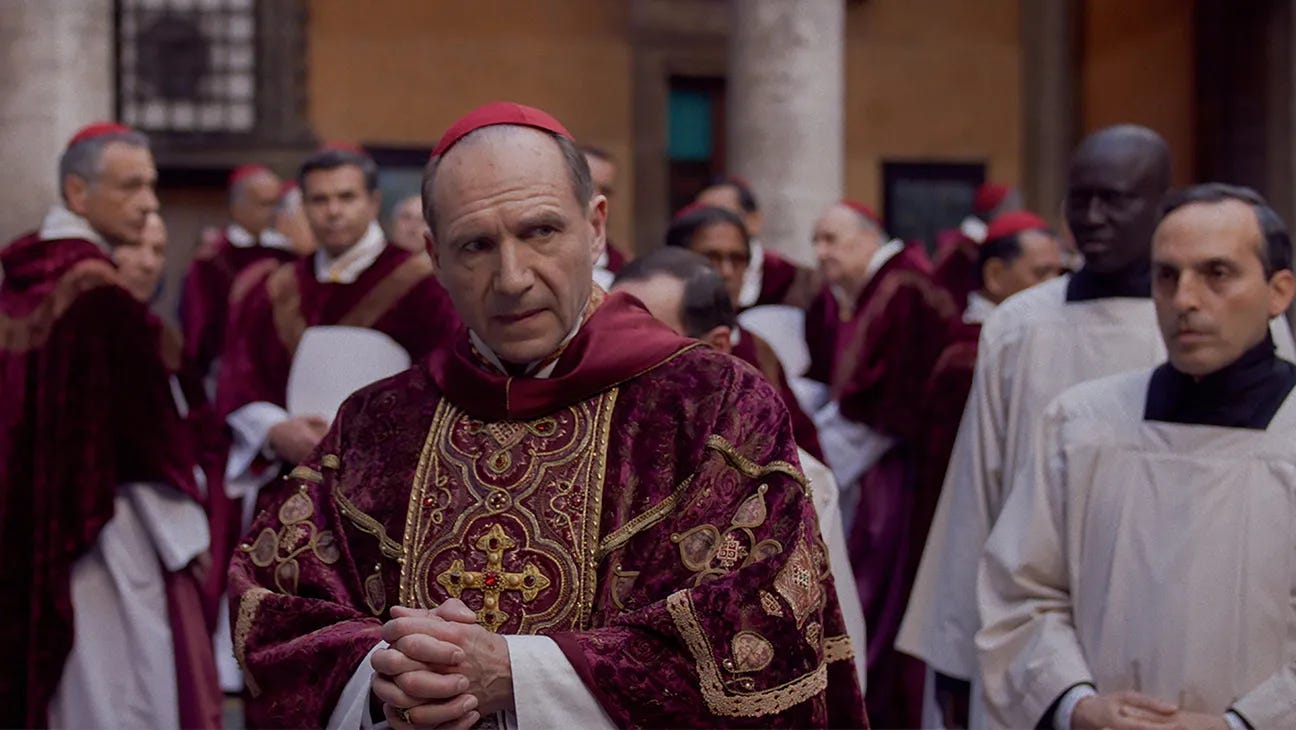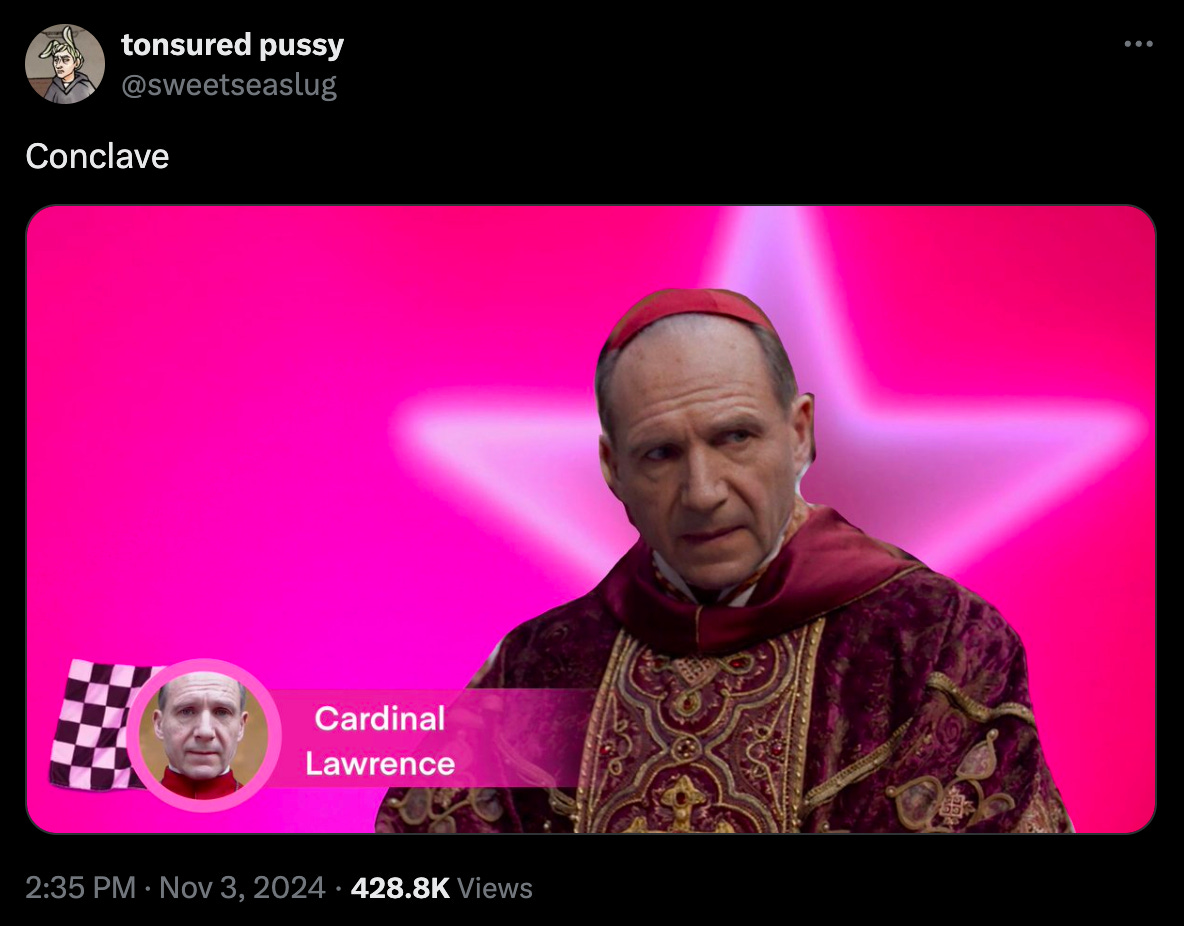Your paid support makes creative endeavors like these possible. Thank you.
I’m going to be transparent with you. Asking me to review a dialogue-driven papal thriller where the bad guy is a cardinal who vapes is like asking a dog to review a scoop of peanut butter. But I’ll do my best.
Conclave, directed by Edward Berger and based on the novel by Robert Harris, tells the story of Cardinal Lawrence (Ralph Fiennes), who, in the wake of the pope’s recent death, is charged with organizing a conclave, that ancient ritual wherein a new bishop of Rome is selected to lead the Church. To do so, he must carefully navigate rival political factions: the liberal sect, headed up by Cardinal Bellini (Stanley Tucci), and the conservatives, championed by Cardinal Tedesco (Sergio Castellitto). The popular Cardinal Adeyemi (Lucian Msamati) provides an additional hurdle for the liberals as he seems poised to become the first African pope, but holds draconian views on gays.
Meanwhile, two other cardinals muddy the waters further. There’s the moderate Cardinal Tremblay (Jonathan Lithgow), who, for reasons no one can seem to ascertain, secures a sizable chunk of the first round of the conclave’s votes, and then there’s Cardinal Benitez (Carlos Diehz), a dark horse who shows up at the last possible second, having been declared a cardinal by the late pope en pectore, or in secret.
It sounds like a lot to juggle for two hours, but it never felt that way to me. While the film has a gloss of prestige, the story’s roots as a pulpy airport novel deliver more than enough page-turning suspense from scene to scene. The Vatican is even shot and lit in pale grays and harsh fluorescents, to honor Conclave’s cultural homeland of Hudson Books at JFK International Airport.
Despite what I just said about suspense, some reviewers found the pacing in Conclave to be too slow. I can see that. There’s a lot of whispering, muttering, and fretting about. There are subtitles. If palace intrigue isn’t your thing, you might feel like you’re sitting around waiting for your meal to arrive, unaware that the rest of us are happily fasting. In other words, there are elements of the Conclave viewing experience that might be a bit punishing. But I like that sort of thing. I grew up Catholic.
I recognize that this was a film tailored to my particular proclivities. The optimal audience member for this movie is someone who was struck with a ruler in Catholic school for saying “heck” and now, as an adult, says “serving cunt” as commonly as they say “hello.” I was reminded of this after I left the theater and the man behind me asked his girlfriend, “why was the score so campy, though?” That is a question I would simply never think to ask. It’s like asking why the pope is wearing a dress. Upon this rock was built the Legendary House of the Lord, Kyle.
I’m not saying a heterosexual of protestant experience wouldn’t enjoy Conclave. It’s superbly acted, and its themes of lofty virtues colliding against the harsh realities of politics are certainly resonant. I simply believe that Conclave will be most enjoyable for people with eyes to see it as RuPope’s Drag Race: Unfrocked, and that’s a lens that you have to consciously decide to see things through. You have to believe that’s what’s going on here. It’s a matter of faith.
Remember that news cycle from last summer where it was leaked that Pope Francis had said the word frociaggine, Italian for faggotry? Many were aghast that the head of the Church would say such a word, while many gays immediately pounced on it as if our handlers had dropped a juicy T-bone steak into our enclosure. We loved it! We were on board even before it became evident that Francis is surrounded by messy gays in the Vatican and the whole thing was more of an “exhausted hag” situation.
Enjoying Conclave was reminiscent of that, for me. Where some might see a dreary exercise in Catholic bureaucracy, I saw fine, fermented, frothy frociaggine. I saw Sister Agnes (Isabella Rossellini) xeroxing incriminating documents in the Vatican to distribute to the cardinals like Regina George in Mean Girls and processed it as iconic diva behavior because Catholic guilt and PopCrave are pulling the levers in my brain like the emotions in Inside Out.
It would seem I’m not alone in this. Conclave memes are flourishing on social media, especially those finding naughty symmetry between the pageantry of the Catholic Church and the gay experience. I love this. It’s making me think about why gays are so drawn to material like Conclave in the first place. As for me, I have special affection for period pieces, for films, shows, and plays that depict people, often women, having to cleverly navigate the social mores of their time. I’m thinking of The Crown, or The Favourite, or Elizabeth. I love movies where there are rules.
When I say rules, I’m talking about suffocating cultural norms. Elizabeth, for example, sees a young monarch whose fledgling authority is undermined because of her sex. But, although she’s their queen, she can’t simply execute her haters, can’t brute-force her way into making them accept her. She is beholden to the rules of the game and, to win it, she will have to strategically determine which rules to follow, and which ones to break. While wearing beautiful gowns and strings of pearls, of course.
I love films set in worlds of strict uniformity, because it’s against such strict uniformity that even slight deviations hold enormous power. I think that might be why I find period pieces and palace intrigue stories gayer than explicitly pro-gay movies that typically end with the message of “shake off the haters, screw the rules, and accept yourself!” Because, well, no. I am surrounded by haters, and I am beholden to the rules. My weapons are gossip, witty one-liners, and fantastic outfits.
I think I love rules, in a strange way. Rules are sort of mother, aren’t they? Like, actual mother. We come from them. If we had nothing to play off against, no sun to our moon, no rules to break, we would not be deviants and, no matter how we dress it up today, our origin story is that of deviancy in the dictionary sense. It’s where we get our power. The rules, the strictness, the oppression can, in storytelling, be appreciated as nearly nostalgic. It feels like home. It wasn’t always a happy home, but nostalgia is not the sole province of happy memories. It has its odd, upside-down pleasures, like gently pressing on a bruise.
Perhaps I love films that depict heightened stakes for even minor transgressions against cultural norms because that’s what the entire world felt like when I was growing up as a closeted gay boy, when every step I took had the potential to put me in harm’s way. I think that’s why, in the fantasy of cinema, I gravitate toward the clever women wearing corsets or, in the case of Conclave, an exhausted man in silk liturgical brocades, toward characters who are simultaneously emburdened and empowered by the game, characters who don’t have the option to exempt themselves from the board. They have to play chess, have to somehow scheme and inch and claw their way to the other side if they hope to become queen.
For me, that’s the context of why Cardinal Lawrence breaking an official wax seal in Conclave registered with the urgency of a gunshot. Small breaches of decorum and small deviations from ritual hit like a truck. Funny, that’s both what Catholic school felt like, and what being a closeted gay kid in Oklahoma felt like. It’s also where sacredness itself comes from, according to French philosopher George Bataille, who said, “The sacred world depends on limited acts of transgression.”
Amen.
In other words, the girls that get it, get it. In Cardinal Lawrence, you will either see a sixty-year-old white man having stern conversations in harshly lit marble corridors, or a lip sync assassin sending bitches home like a heart attack, and that is okay. There are many ways to look at Conclave. It can be campy fun, an insult to the one true Church, an exercise in prestige, or a pulpy thriller that relies on unbelievable twists and turns. But honestly, if you ask me, the least believable part of the whole thing is that men in positions of power would pause for even a second to prioritize principles over political expediency.
Bottom line: Fierce, even if it’s no Joker: Folie à Deux.
You will never be pope.






This is such a phenomenal review. I've been trying to put this idea into words for weeks when recommending Conclave to people but you explained it perfectly. It's catnip for gays raised catholic who love to see the queens battle it out.
I love your movie reviews.